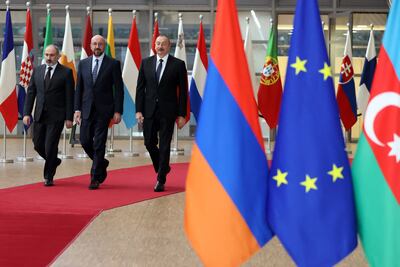The binding issue for Armenians around the globe for the better part of a century has been genocide – gathering evidence to prove they suffered humanity’s greatest horror and leveraging their resulting campaign into a potent voice on the international stage. So it should now come as little surprise that as a sizable chunk of its people may face starvation, they have been quick to tell the world of the looming catastrophe.
Since the Soviet Union’s collapse, Azerbaijan and Armenia have fought two wars over the Nagorno-Karabakh region, with Azerbaijan gaining control of the territory in late 2020. Now recognised as part of Azerbaijan but patrolled by Russian troops, Nagorno-Karabakh and some nearby areas have since the 1990s been governed by a separatist ethnic Armenian entity, the Republic of Artsakh.
In the latest South Caucasus tussle, Azerbaijan has blocked the main road into the disputed region from the Armenian capital Yerevan, leaving the 120,000 overwhelmingly ethnic Armenians who live in Artsakh under siege. The trouble started last December when Azerbaijan enacted a soft blockade, allowing food, supplies and aid to pass through the Lachin Corridor, as the link is known.
Soon after a mid-June scuffle with Armenian troops, Baku completely closed the corridor, in violation of their 2020 arrangement. More than two months later, reports from the region are grim. Cafes and restaurants have closed. Supermarket shelves are empty.
Clinics are low on essential medicines, according to the International Committee of the Red Cross. Ambulances and public buses no longer run due to fuel shortages. Neighbours barter fruit and vegetables as children stand in bread lines for hours and mothers trudge arduous mountain paths for cooking oil. Many districts of the regional capital, Stepanakert, are without water and electricity.

Baku says that it acted to prevent an “ecocide” by the Artsakh government and that the Lachin blockade aims to halt Armenian smuggling into Nagorno-Karabakh. Azeri officials also blame the region’s Armenian leadership for locals suffering, pointing out that the Republic of Artsakh refused their offer to deliver goods via the Azeri town of Aghdam.
“An administration of occupation is blocking the Azerbaijani government’s provision of food and medicine to an Azerbaijani region,” Hikmet Hajiyev, foreign affairs adviser to Azerbaijan President Ilham Aliyev, wrote in National Interest this month.
Local Armenians dismiss this as propaganda and say the plan is to starve them into leaving. The western world, which tends to favour mostly Christian Armenia, has pricked up its ears. Luis Moreno Ocampo, a former chief prosecutor of the International Criminal Court, argued in early August that the starvation inflicted on Armenians represented genocide.
Of course, no people should be deprived of food and medicines, or forced to face starvation. But considering the circumstances, this seems more like siege as a negotiating tactic rather than anything else.
Back in June, Baku and Yerevan were chest-deep in negotiations on a long-term settlement and had recently made significant progress. The main sticking point, after Prime Minister Nikol Pashinyan officially recognised Azerbaijan’s territorial control of the region, was the fate of ethnic Armenians in Nagorno-Karabakh. Yerevan insists they be granted special rights and security guarantees, while Baku is unwilling to resume talks on the enclave’s status and seeks mainly to secure complete control over the territory.
Facing a potential impasse, Azerbaijan may have sought to tip the scales in its favour by putting in place a blockade, which would probably end in one of two ways: either Yerevan would be forced to capitulate to avoid mass starvation; or so many Armenians would flee that the region’s demography would change, and the issue would cease to be a sticking point. On the weekend, Azerbaijani media reported that hundreds of Armenian residents of Nagorno-Karabakh have been allowed to pass through Lachin into Armenia in recent days.
What Baku appears to have failed to account for is that the world tends to frown on even the suggestion of genocide. The outpouring of western support for Armenians and condemnation of Azerbaijan’s ploy both seem to grow by the day, as another major institution or top official highlights the harrowing humanitarian catastrophe.

The UN Security Council held an emergency session on the issue, the EU warned of “dire consequences” for locals, and the US Ambassador to the UN, Linda Thomas-Greenfield, urged Baku to “restore free movement through the corridor”.
Any agreement reached now between the two countries will have been clearly coerced, and its approval by the international community might greenlight the future use of blockades and other strong-arm tactics. At this point, the likeliest outcome may be Azerbaijan lifting the blockade to enable renewed talks, with reduced leverage.
More than a century ago, amid the chaos of the First World War, Ottoman forces drove hundreds of thousands of Armenians from their homes. Many ended up in the Syrian desert and died of starvation. As another mass starvation event looms, Yerevan has been gaining global sympathy.
Even in Turkey, the staunchest ally of Azerbaijan, public figures are speaking out in support of Armenians. “Just as the Berlin blockade was broken,” dozens of well-known Turkish writers and journalists urged in an open letter this week, “we call for breaking the blockade of Karabakh through airlift and thus putting an end to this human tragedy.”
Sieges are relatively common in war. But during peace talks, publicly starving a sizable population – particularly one that has effectively highlighted its suffering for decades – seems unwise.
School starts up again this week in Stepanakert. Expect the buses to return to the roads soon.


